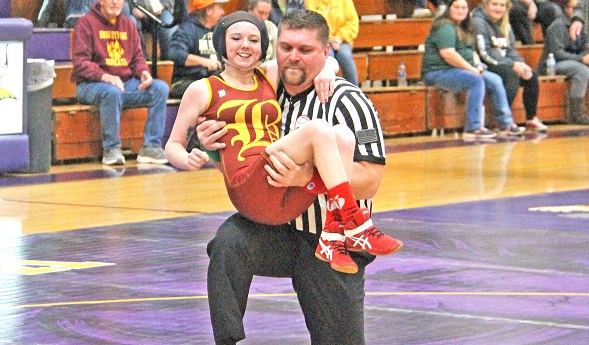
In Her Fight, Inman Seeks to Provide Hope
January 23, 2019
By Wes Morgan
Special for Second Half
The silver lining from tragedy can take a while to come into focus.
 Searra Inman might not have been searching for it in the days that followed a motorcycle accident that would forever change her life.
Searra Inman might not have been searching for it in the days that followed a motorcycle accident that would forever change her life.
Inman wasn’t supposed to survive the July 9 crash that left her paralyzed from the waist down. Surgeons in Indianapolis even used her as a case study due to the fact that almost no one with such severe spinal cord injuries has reached the operating table alive.
So, Inman kept living. Her goals were unchanged. And in the process of that pursuit, she slowly began to realize the lives she was touching along the way. Spurred on by an outpouring of support from her family, church, and classmates and staff at Niles Brandywine High School, Inman faced her new reality head-on.
The first item on the senior’s to-do list was to make good on a promise to herself to earn a four-year varsity wrestling plaque. The second was to reach 100 career victories.
“I love to do these things, and I don’t want to sit in bed the rest of my life and feel discouraged about the situation,” Inman said. “Instead, I pushed forward. Wrestling has helped with it. There were times in wrestling I wanted to quit and give up. Instead, I pushed through it and worked hard and gained a lot of mental strength. It helped me get through my situation.”
Veteran Bobcats wrestling coach Rex Pomranka received the news from Inman directly when visiting her in the hospital. He began talking to local officials about whether or not Inman would be allowed to take wins for the team if opponents failed to produce a wrestler at 103 pounds.
Both the officials and Inman’s doctors gave her the green light.
“She said she had a plan as to how she was going to get out on the mat and that she’d show me at our first meet, which she did,” Pomranka said.
In the season opener Dec. 5 at Bronson, Inman locked the wheels on her wheelchair, climbed down to the floor and crawled out to the circle. Very few people in attendance had any idea what was happening, including referee Kevin Raber.
“I wasn’t trying to show pity or anything, but I was thinking about other kids possibly snickering or saying something that was inappropriate,” Raber recalled. “I took a couple steps to her so she didn’t have to crawl all the way out to the middle. I raised her arm up and congratulated her.
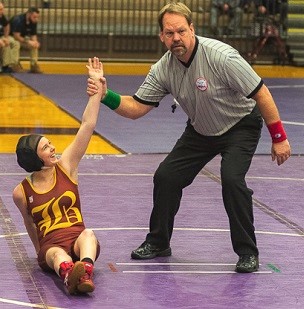 “When it was all done, I didn’t want anything negative to happen, so I said, ‘Do you mind if I pick you up?’ She said, ‘It’s up to you.’ I said, ‘Well, I’d like to.’ So, I just picked her up. Everybody started clapping and it was a very moving moment. I didn’t realize until I was in the middle of it what was going on. Man, I had to swallow my tears in that moment. It was definitely profound and moving for me.”
“When it was all done, I didn’t want anything negative to happen, so I said, ‘Do you mind if I pick you up?’ She said, ‘It’s up to you.’ I said, ‘Well, I’d like to.’ So, I just picked her up. Everybody started clapping and it was a very moving moment. I didn’t realize until I was in the middle of it what was going on. Man, I had to swallow my tears in that moment. It was definitely profound and moving for me.”
Inman didn’t know what to expect as she boldly slid out of her wheelchair.
“I was nervous and so embarrassed,” she said. “I told my assistant coach that I didn’t know if I was ready to go out there. I didn’t know how it was going to look. I built up some courage, crawled out and, with everybody clapping, it made me feel like I was still out there wrestling even if there wasn’t an opponent.”
She didn’t mind the lift from Raber either.
“When he asked to carry me, I was happy,” she said. “I didn’t want to crawl back to my chair. There was somebody who wanted to help and saw how hard I was willing to push myself.”
Raber, unaware of Inman’s accident and the community’s fundraising efforts, felt compelled to donate his check from that night, as well as additional money, to Inman’s family — information he didn’t voluntarily divulge. He even made a trip to Brandywine a week later to talk to her about that emotional night.
“I was honored to be in that moment with her,” he said. “I officiate because I love the sport of wrestling. If it could help her have a little brighter Christmas, to be able to help her parents or anything, she could use it with a better purpose than I ever could have.”
Like Raber, Pomranka hardly kept it together that evening.
“I was in tears,” said Pomranka, whose brother was paralyzed in an automobile accident nearly 30 years ago. “This was a goal she was shooting for. I was trying to hide the tears; I’m was glad she was able to get back on the mat and do something she enjoyed. I’m just happy she is here to finish out her senior year.”
It was Inman’s 76th career victory. She’s now at 95 with the season winding down.
“It’s either going to happen at our last dual meet or at Districts if everything goes right,” Pomranka said of Inman reaching 100 wins. “A lot of the coaches have been really nice to bump their lineup around so she can get the forfeit. I appreciate the coaches doing that. They want to see her get to 100.”
Inman’s father, Chris, thought back to the day in the hospital when he had to deliver news no parent should have to deliver.
“For a day and a half, I was upset because I held back,” he explained. “We wanted to get all the information from the doctors. But she was starting to figure it out.
“She said, ‘Dad, tell me what’s going on?’ I walked up with tears in my eyes and she knew. ‘I’m paralyzed, aren’t I?’ She looked away with a tear in her eye and she just collected her thoughts. It was that mentality that I’ve seen from her with any challenge she has ever faced. She said she was going to walk again. From that moment on, that has been her drive. She’ll never walk without the assistance of something, but her goal is to get back upright.”
More goals include driving a car and, even if reluctantly, getting back to everyday tasks a lot less exciting than wrestling.
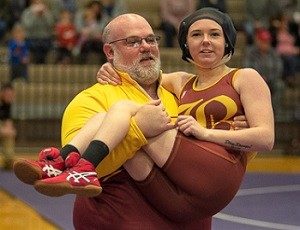 “My mom (Pepper) is always pushing me to do things I may not like doing, even though I’m in a wheelchair,” Inman said. “She tells me, ‘Would you have done it if you weren’t in a wheelchair?’ So, I go and do it.”
“My mom (Pepper) is always pushing me to do things I may not like doing, even though I’m in a wheelchair,” Inman said. “She tells me, ‘Would you have done it if you weren’t in a wheelchair?’ So, I go and do it.”
She still enjoys working on cars and motorcycles, changing the brakes on her parents’ vehicles and getting her hands greasy. But Inman’s passion is helping animals, so she plans to attend Lake Michigan College for two years before working toward a degree in veterinary medicine at Michigan State University.
Helping her get there have been a host of teachers, friends and even strangers. Teachers film their classes and send the video to Inman while she’s doing physical therapy at Mary Free Bed in Grand Rapids two days a week. Her therapists, she said, are aiding Inman in reaching a goal: She plans to surprise everyone on graduation day.
The funds raised by the community have kept the Inman’s out of what would have been crushing debt from medical bills. They’ve read and saved every well-wishing card they’ve received.
Admittedly private, Chris – who teaches at Brandywine – described how the community has rallied behind his family as a humbling experience.
“Early on they had her on a video conference live at the school,” he said. “It was a big fundraiser. They panned around and Brandywine’s cafeteria and hallway for hours was crowded. (Searra) made the comment, ‘Good grief, with this much support I can’t fail.’
“That was huge for her. I’d go into Walmart or a gas station or whatever, and people would just come up and give me a hug and ask about Searra. We started to see the impact, and people started sharing their stories and how they gained strength through Searra’s story. She didn’t even realize the impact she was having on everybody. Now she realizes her decision to stay positive and to smile has really impacted people.”
“The world sometimes is a rough, hard place,” Chris said. “You hear about all the bad stuff. You initially think you’ll never get through this. But people come out in support and share their stories, and then you realize the place where you live is pretty amazing.”
So is watching Inman smile as her hand is raised in victory.
“I have known a lot of people who have given up on something they really enjoyed because something bad happened,” she said. “I’m hoping with this situation I can bring out the best in it and give other people who don’t think they have a chance at something a reason to go out there and strive for it.”
 Wes Morgan has reported for the Kalamazoo Gazette, ESPN and ESPNChicago.com, 247Sports and Blue & Gold Illustrated over the last 12 years and is the publisher of JoeInsider.com. He can be reached at [email protected] with story ideas for Berrien, Cass, St. Joseph and Branch counties.
Wes Morgan has reported for the Kalamazoo Gazette, ESPN and ESPNChicago.com, 247Sports and Blue & Gold Illustrated over the last 12 years and is the publisher of JoeInsider.com. He can be reached at [email protected] with story ideas for Berrien, Cass, St. Joseph and Branch counties.
PHOTOS: (Top) Niles Brandywine wrestler Searra Inman is assisted off the mat by official Kevin Raber during a match this season. (Middle) Official John Bishop raises Inman's arm in victory during a match at Three Rivers. (Below) Brandywine coach Rex Pomranka assists Inman. (Top photo by Troy Tennyson/Coldwater Daily Reporter. Middle and below photos courtesy of JoeInsider.com.)
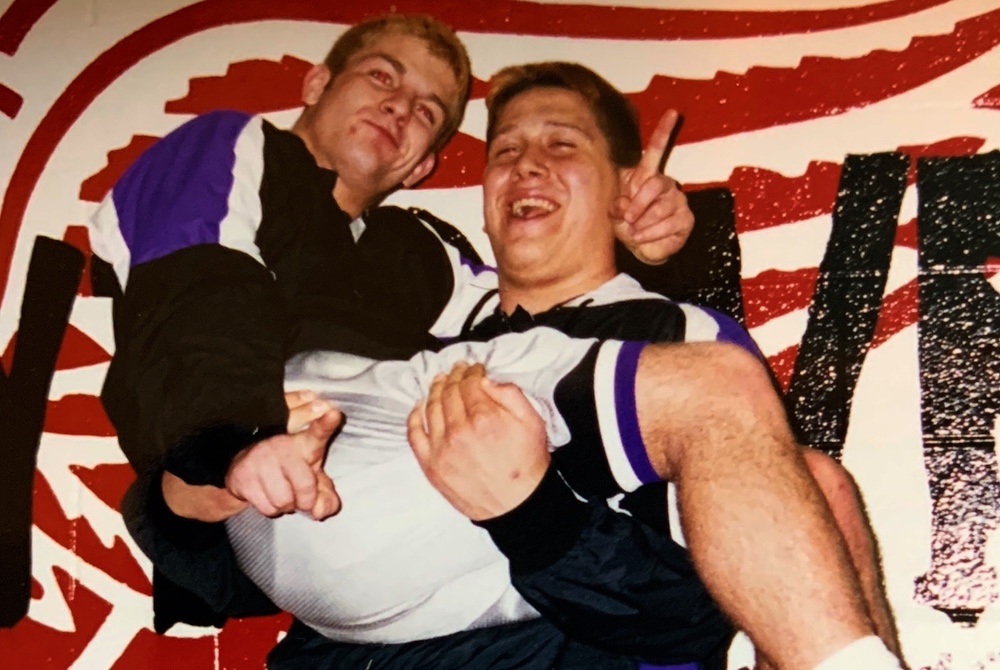
Caro Champs Find Common Ground Again as Mental Health Providers
By
Paul Costanzo
Special for MHSAA.com
July 8, 2021
Phil Millerov and Phil Niklowicz wanted to do more than simply defeat opponents when wrestling at Caro High School.
They wanted to dominate – physically and mentally.
 “We had this thing between us where we wanted to be done, and (opponents) didn’t want to come back on the mat with us,” Millerov said.
“We had this thing between us where we wanted to be done, and (opponents) didn’t want to come back on the mat with us,” Millerov said.
Twenty years later, both spend their days building people up. Millerov is a licensed professional counselor, while Niklowicz is a licensed therapist.
“I went out there looking to dominate and make sure it was known that I am the superior wrestler in all facets,” Niklowicz said. “I would try to run up as many points as fast as I can. I would teach the same thing when coaching, specifically with my nephew. You’re saying, ‘Listen, we want to break these people.’ Then the next day, in a therapy session, it’s like, ‘Let’s build up your self-esteem and set some goals to boost ourselves up.’”
The close friends and two faces of Caro’s surging wrestling program in the late 1990s now have very similar careers. Millerov – who finished second, third and first at 275 pounds in the 1998, 1999 and 2000 MHSAA Finals, respectively -- works in private practice at Transitions Counseling Service in Greenville, where he specializes in substance abuse disorders. He also has served as a Class 1 Fellow at the WK Kellogg Foundation.
Niklowicz – a two-time MHSAA Finals champion (1999 and 2000) and four-time placer – is working in private practice in Southfield, seeing mostly children. He also works in adult foster care with patients who have had traumatic brain injuries.
“He and I went and hiked Pictured Rocks at the beginning of May,” Millerov said. “And we joked about how nobody would have guessed that we’d be doing this now.”
That Millerov and Niklowicz are still close does not come as a surprise. Their friendship began when their wrestling careers did, as 6-year-olds in the Caro Growlers program. As they were becoming two of the state’s top wrestlers, they would share rides to tournaments, and their families grew close.
In high school, despite their size difference – Niklowicz wrestled at 135 his senior year – it wasn’t uncommon to see them warming up together.
“We were definitely easy going and liked to mess around a lot,” Niklowicz said. “We used to mess around before meets and throw each other. He would jump and I would throw him. People would look at us like, ‘Why is that little guy throwing that big guy?’”
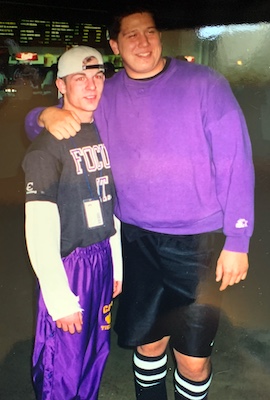 While their teams never made it out of the Regional, Millerov and Niklowicz helped set the stage for a program that would become among the best in Division 3 throughout the 2000s, qualifying for five straight Quarterfinals from 2003-07 and winning the Division 3 Finals title in 2003.
While their teams never made it out of the Regional, Millerov and Niklowicz helped set the stage for a program that would become among the best in Division 3 throughout the 2000s, qualifying for five straight Quarterfinals from 2003-07 and winning the Division 3 Finals title in 2003.
Individually, they were among the most well-known and feared wrestlers in the state.
“Niklowicz and I were fortunate to have each other, because we pushed each other,” Millerov said. “We were in constant competition with each other and ourselves. Just to kind of push each other, it was a great thing.”
Niklowicz finished fifth as a freshman and third as a sophomore before winning back-to-back titles to close out his career. In 1999, he defeated Nick Oertel of Goodrich 9-2 in the 125-pound final, and the next year he defeated Oertel’s teammate, Ryan Tripp, 7-5 at 135. Tripp would go on to win an individual title the following year. Niklowicz would finish his career with 214 victories.
“I think probably both (Finals titles) were equal,” Niklowicz said. “I think there was probably a little more stress going into my senior year. My motivation always came from improving, then it was maintaining the state title. You don’t want to go the opposite direction.”
Millerov lost a tight 6-4 decision against Remus Chippewa Hills’ Bob Kozlowski in the MHSAA Finals as a sophomore, and had an epic 12-10 match against future NFL defensive lineman Jason Babin of Paw Paw in the 1999 semifinals before fighting back to take third. The next year, he won his title via first-period pin against Dan Kliphuis, a two-time runner-up from Grand Rapids West Catholic. Millerov finished with 196 career wins and set the state record for pins in a career (160), which was broken the next season by Nick Simmons of Williamston and is now held by Justin Zeerip of Hesperia. The 56 pins Millerov recorded his senior season remains second all-time to Simmons, who had two seasons with 57.
“I never really thought about (the pin record) to be quite honest,” Millerov said. “It was just kind of in the background. It didn’t matter; all I cared about was winning this match, and I wanted to do it in the most effective, efficient way I could.”
They both continued their wrestling careers, but went their separate ways in college, with Millerov heading to Neosho County Community College in Kansas and Niklowicz to Virginia Tech.
Millerov had interest from several Division I schools coming out of high school, including some in the Big Ten, but he admits his grades weren’t good enough at the time. Neosho provided a chance to compete with some of the best in the country while at the junior college level, however, as the team took second at the National Junior College Athletic Association championships in 2002.
He transferred to Central Michigan after his sophomore year, joining his girlfriend – now his wife – who was already attending, and walking onto the wrestling team. While his relationship lasted, wrestling did not.
“I was distracted,” Millerov said. “My grandmother passed away in 2002 in that summer. I was trying to get that motivation back, and I just lost it. There has to be that edge with wrestling. When things didn’t work out, I struggled. Wrestling was my identity.”
Millerov was working to follow in his father’s footsteps and become a police officer. But the elder Phil Millerov, who died in 2012, talked his son out of it.
“Looking back on it, for me, it was obviously the right decision,” Millerov said.
The idea to go into counseling came after Millerov was married in 2006, as his wife had gotten into the program. He went back to school to earn his bachelor’s degree from CMU in 2007, and would go on to get his master’s from CMU, as well.
“I had taken a bunch of psychology courses just because I liked the field,” Millerov said. “I liked to be challenged. I liked puzzles, and with psychology, it’s like a new puzzle every hour. It just clicked. I flew through and graduated with like a 3.8. I was like, ‘Wow, I kind of feel smart.’ It was good to find something I was passionate about again.”
Millerov said he’s constantly learning and honing his craft, much like he did as a wrestler. A major difference now, however, is that he’s found more balance in his life.
“I think about working with athletes in addiction, I find a lot of similarities,” he said. “Wrestling was my life, it’s how I identified myself. I hear that same kind of talk around people struggling with addiction. One you’re considered successful for, the other you’re not. Most of my growth has been around finding balance. I find that my happiness and my clients’ as well, is when we found that balance instead of being good at just one thing. I want you to have passion, I want you to do things you love, but I also want you to be effective as a husband, a father, whatever other responsibilities you have.”
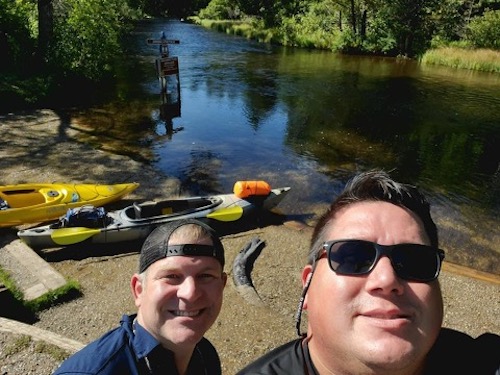 Niklowicz’s journey to becoming a therapist was more telegraphed, as both of his parents work in mental health, and he said it was always something he wanted to do, as well.
Niklowicz’s journey to becoming a therapist was more telegraphed, as both of his parents work in mental health, and he said it was always something he wanted to do, as well.
He attended Virginia Tech on a wrestling scholarship, but transferred to Eastern Michigan after one year. The Hokies had recruited him to wrestle at 133 pounds, but when the team’s 125-pounder was injured, Niklowicz was asked to cut down further. Like Millerov, he struggled when his wrestling career ended.
“I just had a really bad taste in my mouth after leaving Virginia Tech and trying to cut all this weight,” he said. “Some of it was I had lost the desire to work out, to wrestle. Fifteen years, roughly, of my life was dedicated to wrestling, and once you stop, what do I do with my winters? What do I do with seven months of the year? It was definitely a part of my identity; that’s why I got into coaching. I did MMA fighting for a little bit to have something competitive.”
Like Millerov, Niklowicz said finding balance was important.
“In the mental health field, specifically, there’s a lot of burnout for people,” he said. “Every day, you’re listening to people talking about their problems, but at the same time, they’re coming for a reason and they’re there for help, so you have to provide that help and have to motivate yourself to come to the office every day and give it your best. I try to instill the motivation that I used to other people.”
When Niklowicz looks at his time as an athlete compared to his work as a therapist, he said that work ethic is the main characteristic that has carried over.
“I think my practice mentality was the same as it was on the mat,” he said. “Even in the wrestling room, these are people I’m friends with, people I grew up with, and I still didn’t want anyone to score on me. Then you just look at your work ethic outside of wrestling, whether you’re studying for exams or motivating yourself to get up and go to class.”
While they are no longer living in the same town or living similar lives – Millerov is married with three kids, while Niklowicz is single – the connection between Caro’s dominant duo remains strong, both professionally and personally.
“I don’t think we ever thought we would be going down such a similar path, and I doubt that either one of us grew up thinking we would do the exact same thing,” Niklowicz said. “We met when we were 6 years old, and we’ve been best friends forever. I think it’s hilarious that we’ve taken such similar paths but with some glaring differences. It’s definitely interesting that we’re still really good friends after 30-some years, especially since we’ve moved on and gone our separate ways.”
2020-21 Made in Michigan
June 28: Michigan's Minor Leaguers Making Up for Lost Season - Read
PHOTOS: (Top) Caro’s Phil Millerov lifts teammate Phil Niklowicz as both celebrate Division 3 championships during the 2000 Individual Finals at Joe Louis Arena. (Middle) Niklowicz, left, and Millerov were high school warm-up partners despite wrestling at significantly different weights. (Below) Niklowicz and Millerov take a selfie during a hiking trip to Pictured Rocks National Lakeshore in May. (Photos courtesy of Niklowicz and Millerov.)

